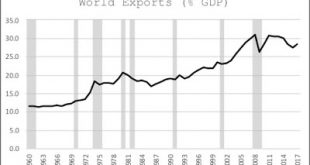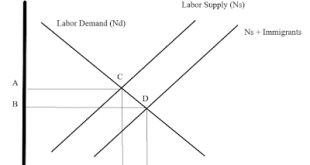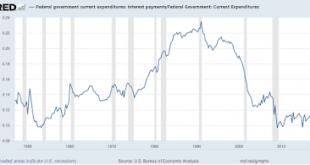So Olivier Blanchard gave the AEA presidential address at the Atlanta meetings earlier this year. If you missed it you can watch it here. The paper is also here. In all fairness, there is nothing new there. He notes the famous rule by Evsey Domar about sustainability of public debt, meaning that if the rate of interest on debt is lower than the rate of growth, debt-to-GDP ratios tend to be stable and you are in no danger in pursuing active fiscal policies.Note that functional finance is in...
Read More »A global macroeconomics – yes, macroeconomics, dammit – of inequality and income distribution
Below the text of the first Godley-Tobin Lecture by James K. Galbraith.According to an approximate count, there are 848 sub-categories in the classification codes of the Journal of Economic Literature. Of these, five relate to income inequality. Two are classed under Microeconomics: D31 ‘Personal Income, Wealth and Their Distribution’ and D33 ‘Factor Income Distribution.’ Two are classed under ‘Health, Education and Welfare’: I14 ‘Health and Inequality’ and I24 ‘Education and Inequality.’...
Read More »Trade and Finance
Teaching a course on international economics (trade and finance) for international relations students. More on that later. Just wanted to post the exports to GDP ratio for the world. This is to give students a sense of the increase in trade in the last few decades, and also the relative stagnation since the 2008 Global Financial Crisis. Note that while exports are about US$ 23 trillion in a year, the daily turnover in the foreign exchange market is about US$ 5 trillion, according to the...
Read More »Heterodox Journals and Impact Factors
I blogged about journal rankings a while ago. As I said back then, journal rankings matter in decisions about grants and academic promotions, and there are biases against heterodox journals. So even if there are many problems with those measures (read previous post), they are still relevant. The Review of Keynesian Economics (ROKE), founded by Tom Palley, Louis-Philippe Rochon (now at ROPE) and myself, has now an impact factor of 0.738 in last year’s Clarivate Report (Thomson-Reuters...
Read More »Raúl Prebish’s Unpublished Manuscripts on the Buenos Aires Lectures on Economic Dynamics
By Esteban Pérez CaldenteyRaúl Prebish’s Unpublished Manuscripts on the Buenos Aires Lectures on Economic Dynamics edited by Esteban Pérez Caldentey (ECLAC) and Matías Vernengo (Bucknell University), have been published in the ECLAC Review, August 2018 Raúl Prebisch (1901–1986), the Second Executive Secretary of the Economic Commission for Latin America and the Caribbean (ECLAC) which he joined in 1949 is mostly known for his long-run analysis and diagnostic of the development problem of...
Read More »The three caballeros: on populism and the economy
Cartoonish figures... and Disney toons too With the incoming inauguration of Jair Bolsonaro in Brazil, the United States and the two largest countries in the Latin American region will have what the press has more or less universally and uncritically referred to as populist leaders in power. It has been very common in the press to compare Trump and Andrés Manuel López Obrador (AMLO) as right and left-wing populists. And although the term has not been applied as often to Bolsonaro,...
Read More »A primer on the economics of immigration: a surplus approach perspective
This is definitely not my topic of research. So you may very well ask why would I venture to wrote about it, beyond the obvious reason that it is probably one of the most debated issues these days in the US, with the government shutdown being related to the now infamous wall. I am myself twice an immigrant, I descend from immigrants (my parents returned to their country of origin, but had emigrated, and on my mother side my grandfather was also an immigrant, and the same goes on my father's...
Read More »Galbraith versus Piketty on Inequality
A new paper by James k. Galbraith has been published in Development & Change. It's along the lines of his arguments in the Godley-Tobin Lecture delivered earlier this year, and to be published in the Review of Keynesian Economics (ROKE) in January. Basically, we need a macro story for inequality (which Piketty r-g framework tries, but ultimately fail to provide) and that the payroll data that Galbraith uses provides a more accurate measure of inequality than the tax records favored by...
Read More »Financialization and the low burden of public debt
Financialization is a fuzzy concept. There are many definitions, and none is clear cut, at least to characterize the changes of the last 40 years or so, which is the period most authors associate with financialization. I'm not suggesting it's not a useful concept though.* In some sense, financialization refers to the last phase in the capitalist system (even if there are ways in which one might argue that capitalism was always financialized). At any rate, going to the point I wanted...
Read More »Middle Income Trap or the Return of US Hegemony
Short essay in Spanish for the special (40 year anniversary of the journal Coyuntura y Desarrollo, published by the Fundación de Investigaciones para el Desarrollo, FIDE). It is essentially a critique of the concept of middle-income trap and the idea of how the demographic transitions (discussed here before) affect the process of development. It suggests that the deindustrialization of the Latin American periphery results as much from the decisions in the hegemonic country to open up...
Read More » Naked Keynesianism
Naked Keynesianism







